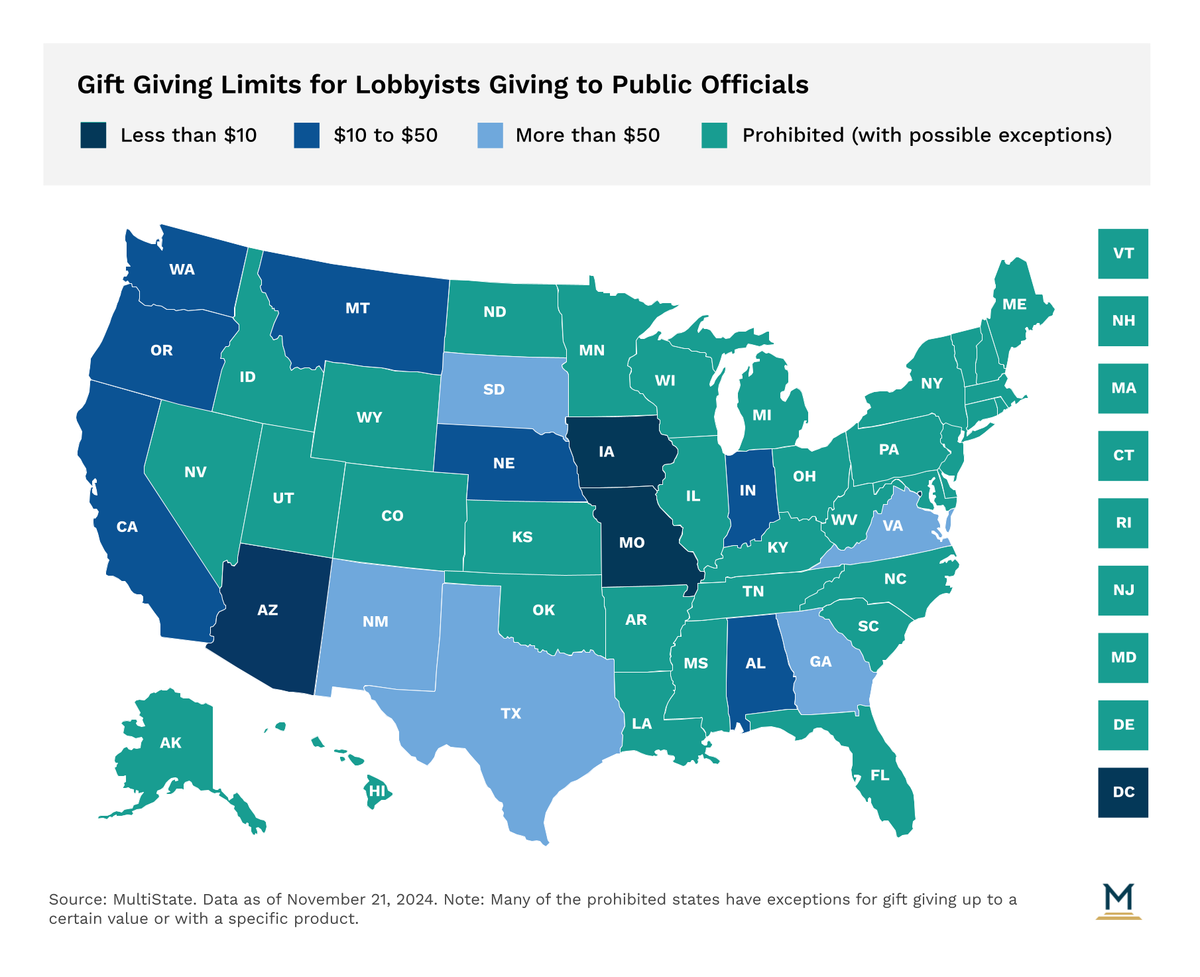
Compliance
New York City Annual Lobbying Report Offers Look at Lobbying Trends
April 3, 2025 | Ben Seitelman
December 10, 2024 | Ana Boulay

Key Takeaways:
As the holiday season once again draws near, government affairs professionals may begin to think about gifts to give to their personal friends or colleagues in government that they’ve worked closely with throughout the year. Gift baskets composed of artisanal products or specialty foods specific to your home state are easy and thoughtful presents, as is extending an invitation to a holiday party. However, the rules surrounding lobbyists giving gifts to public officials are still something to be mindful of during this festive season.
During the holiday season, giving baskets of treats, sweets, and beverages is very popular. However, many states prohibit giving such items or other similar minimal-value trinkets to public officials. Lobbyists need to use caution when giving a gift. The map below shows states with gift giving restrictions.

If a state has a “source” or “intent” rule, they are classified as prohibited in this map. The source rule refers to the giver of a gift such as an interested party (like a lobbyist), whereas the intent rule refers to the motivations behind giving a gift. For example whether the giver wants to influence a public official. Gift giving may be accepted depending on the source or intent restrictions, however, these restrictions vary from state to state.
For example, Mississippi has strict rules surrounding the reporting of gifts. Mississippi law requires a lobbyist to report anything of value provided to a public official that is over $25 in value. However, “anything of value” does not include food and beverages for immediate consumption up to a combined value of $10 throughout the year. Lobbyists in Mississippi would be wise not to forget to report a gift given over the holidays if it exceeds the reporting threshold and does not qualify for an exemption (Miss. Code § 5-8-3).
On the other hand, Ohio is a little different. The gift law in Ohio states that a member of the General Assembly may not receive a gift from a lobbyist that is more than $75 in the aggregate per calendar year. Under Ohio’s law, lobbyists would be able to send a holiday gift basket to an elected official in Ohio; however, similar to Mississippi, a lobbyist would be required to report this gift if the value exceeds $25.
In addition to value limitations, Ohio, like many states, has an “improper source prohibition” which means that in addition to the value of the gift that is being given, public officials also need to consider the source of the gift. Public officials may not accept a gift from an improper source which is any entity that is interested in doing business with an agency that the public official works at, an entity that is regulated by said agency or an entity that is interested in matters having to do with the agency. If a giver falls into any of these categories, the public official may not accept a gift from them (Ohio Rev. Code Ann. § 102.031).
Another frequent occurrence during the holiday season are holiday parties which often include food and beverages. Again, whether state officials may be invited to these parties, specifically by lobbyists, is dependent on the state and no one-size fits all rule applies. Holiday parties typically fall into the category of “things of value” that state officials may or may not receive, based on the food or other products they would have access to at a party.
South Carolina has some of the strictest regulations surrounding lobbying activities and gift giving in the country, particularly because they offer few exceptions to their existing laws. State officials in the Palmetto State are not allowed to accept an invitation to an event that is paid for by the lobbyist principal. Under these regulations, if the lobbyist employer hosts a holiday party, a state official would not be allowed to attend. The only exception to this rule is if the entire membership of the officials’ agency or chamber is invited or if the activities at the event are related to economic development efforts (S.C. Code Ann. § 2-17-90).
Conversely, in New Hampshire, officials can attend an invitation-only event if it is public or if there are more than 50 people in attendance. Additionally, these events must be ceremonial or celebratory and can include meals, beverages and lodging as long as the previously stated requirements are met (N.H. Rev. Stat. Ann. § 15-B:2).
If a lobbyist violates ethics regulations regarding giving and receiving gifts, they may be susceptible to penalties. While these penalties vary depending on the state, they can range from civil penalties, to a criminal conviction. Failing to abide by ethics regulations may expose lobbyists and their employers to negative publicity and press causing reputational harm in addition to the state’s penalties. These violations can linger among clients and prior compliance issues can be tracked, thus it is crucial for the reputation of a firm to abide by gift giving regulations. Amidst the holiday and end-of-year celebrations, ensure that all guidelines are met in order to avoid a troubling start to the new year.
Keeping up with rules, deadlines, and often confusing requirements is a daunting prospect for teams of all sizes. Let us manage your federal, state, and local registration and reporting responsibilities, or manage your Campaign Finance program. Read more about our Compliance Services here, or get in touch here.

April 3, 2025 | Ben Seitelman

April 2, 2025 | Chase Klingensmith, Dylan Busler

March 4, 2025 | Chase Klingensmith, Dylan Busler